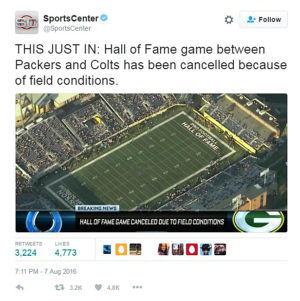


Even Hall of Famers Can Fumble Crisis Management
[By Thom Fladung, Hennes Communications]
Imagine this: You’re running a meeting and you have information that will affect everyone else in that meeting negatively. You decide not to share any of that information during the meeting and prattle on as if nothing is about to change or happen.
Except everybody in the conference room finds out at the end of the meeting. Good day at work?
Now, imagine there are 22,000 people in your meeting.
That, in essence, is what happened at the 2016 Pro Football Hall of Fame Game in Canton last month. The game was canceled because of poor field conditions and concerns about player safety. The players were told about 90 minutes before kickoff. About an hour before kickoff, the National Football League announced the cancellation on social media.
Except nobody told some of the most important people involved – the 22,000 fans in the stands.
As Kevin Kleps reported recently in a well-done piece in Crain’s Cleveland Business, the cancellation announcement wasn’t made at the game until just before the scheduled 8 p.m. kickoff. Some people at the game, checking their Twitter feeds on their smartphones, figured it out earlier. Lots of people at the game did not.
Kleps also cited Gregg Doyel’s column from the Indianapolis Star, reported from the game. Doyel talked to fans, who’d continued to buy food, paraphernalia and programs right up to the kickoff of a game that wasn’t going to happen.
“It was intentional. It was deceitful,” Doyel wrote. “It was the Pro Football Hall of Fame keeping alive the façade, using its scoreboard to show a countdown to an 8 p.m. kickoff that would never happen, because there was money to be made.”
Full disclosure: I grew up in Canton, I’m a big fan of the city and the Hall of Fame and my instinct is to defend both. I would like to think that this was not intentional deceit but yet another example of panic, indecision and a ham-handed attempt at communications amid a crisis.
In either case, it didn’t have to turn out this way.
Not surprisingly, as Kleps reported, a lot of the fans, who traveled from Indiana, Wisconsin and other far reaches to see some of their retired heroes join the Hall of Fame and watch their beloved Colts and Packers play, were not happy. Even less surprisingly, attorneys now are involved to turn that unhappiness into a class-action lawsuit against the NFL and the Hall of Fame.
The Hall of Fame has offered reimbursement to all ticket-holders, including parking and a night of hotel accommodations and is throwing in other perks like museum admission tickets.
That’s a good idea. At Hennes Communications, we counsel clients “When you mess up, fess up and fix up.”
Here’s a bad idea: In the face of the lawsuit, the Hall of Fame is going silent. The Hall told Crain’s it “does not have a comment at this time” when contacted for the recent story. “No comment” is never a good option.
Here’s the best idea: Our top-line advice for communications amid a crisis is always to tell the truth, tell it all, tell it first and tell it fast.
And for goodness’ sake, tell the people in the room with you.
Thom Fladung is a vice president at Hennes Communications and a 33-year veteran of newspaper newsrooms, including serving most recently as managing editor of The Plain Dealer.